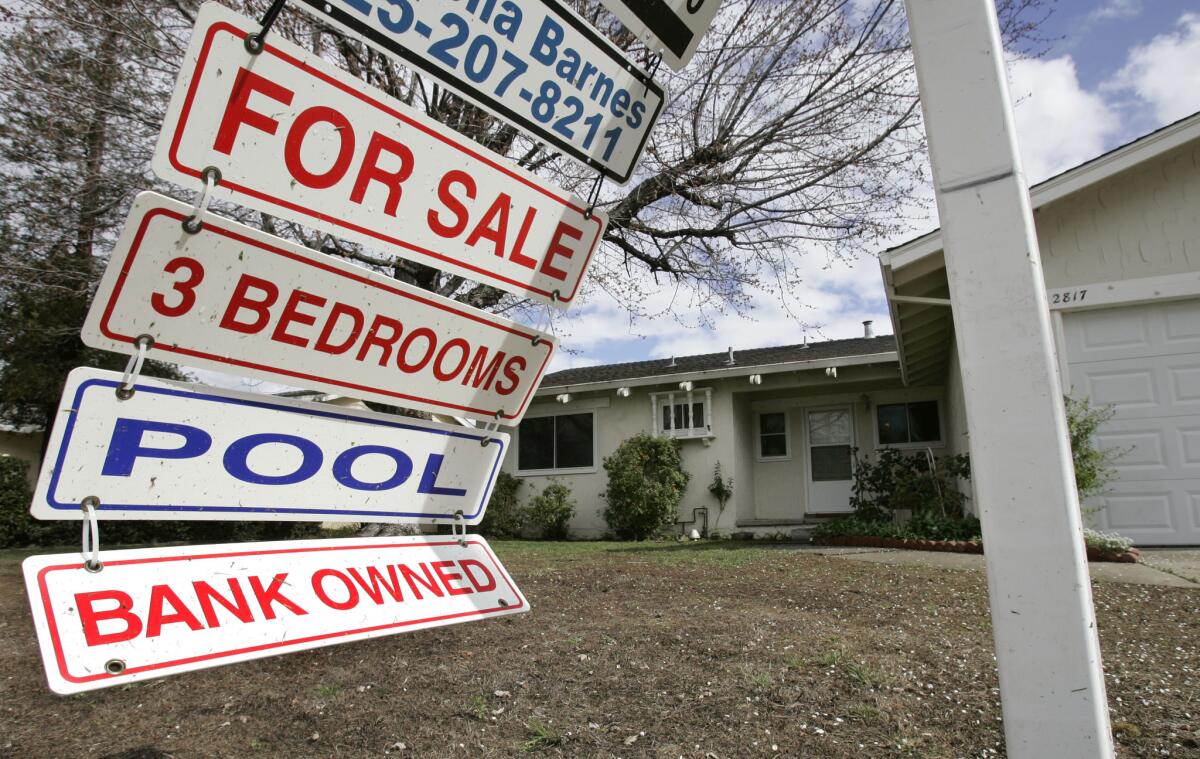The financial crisis hit 10 years ago. For some, it feels like yesterday

The Sept. 15, 2008, bankruptcy filing by investment bank Lehman Bros. 10 years ago today marks the unofficial start of the crisis that nearly took down the financial system.
For many Americans, the significance became apparent when they faced a layoff or the loss of a home — and the ramifications were felt for years. Nearly 9 million people lost their jobs and at least 10 million lost their homes. Within four years, 46.5 million Americans were living in poverty.
The Times heard from several Southern Californians about how the financial crisis affected their lives. Read their experiences below.
Have you rebounded? Track the recovery of home prices in Southern California »
Call it triage
Katrina Matthews was headed to law school, working part time at a real estate company in Manhattan Beach when the financial crisis hit.
“This is a fire I need to put out,” she remembered thinking at the time.

For the next five years, she assisted South Bay homeowners on the brink of foreclosure. What started as a handful of people asking for help eventually turned into an overwhelming number that forced Hughes to work 15-hour days. She called it “triage.”
“The mentality back then was that homeowners were deadbeat. That wasn’t the case. They were trying to get help but the banks weren’t listening to them. Nobody cared.”
From Los Angeles to Rancho Palos Verdes to Inglewood, everyone had a different story. Couples in the midst of divorce, grandmothers who could no longer afford their homes, longtime building tenants suddenly faced with doubled payments. Matthews helped dozens sell their homes often for less than the value of their mortgage.
“A good majority of them were still working people who couldn’t afford it anymore.”
The stress took a toll on Matthews’ personal life, but if she had to, she said she would make the same decision she made 10 years ago.
“I was born and raised in Southern California. I’m going to help my people out, especially when people are coning to me.”
No resolution
Theodora Stephan’s credit score still hasn’t recovered.
In the year before the financial crisis, Stephan closed several credit card accounts following a divorce. Further complicating matters, she asked Bank of America if she could get out of her interest-only loan and switch to a loan that would allow her to pay off her principal in the hopes of lowering her mortgage payment. She was supporting her two daughters, both in middle school, on her own.
“[Bank of America] told me I needed to be in financial duress. I told them I was; however, at the time I was making sure to make my payments.”

Stephan was told that in order to qualify for a loan modification, she’d need to skip payment for three months. She did, but then the notices came warning of potential foreclosure proceedings. Eventually, she found herself underwater on the mortgage on her Los Olivos home, the property worth less than the balance of the loan.
Stephan was able to keep her home and eventually get it refinanced for an affordable monthly rate. But she has struggled to put her daughters, who have student loans themselves, through college.
“My credit has been destroyed and I’m exhausted,” she said. “I just feel totally screwed.”
Homeowner no more
Mechele H. says her family is still living paycheck to paycheck.
She and her husband owned a home in Huntington Beach for 10 years. When the financial crisis hit in 2008, her husband — who had suffered a heart attack the year before — saw his hours and pay cut.
“We lost over $300,000 in our 401(k), and eventually our home.”
She is now a renter with little hope for that to change.
“We will never be able to own a home here again.”
So long, California
In August 2009, Karen Guyer was laid off from work. No one was hiring, she said, especially someone of retirement age.
Three years later, she sold her townhouse of 25 years in Diamond Bar and moved to Idaho.
“We found the cost of living to be considerably less than Southern California, making the recession somewhat more survivable.”
Guyer said she was more fortunate than others, but not without taking a hit. She thinks about the future, concerned about the impact her life will have on her kids.
“Now I worry that our Social Security and Medicare will be taken away and we will become a burden on our children.”
More takeaways
“Because my employer had to cut back hours, I learned to live a much simpler lifestyle. Now that the hours are back, I'm better equipped to live within my means and not purchase things I really don't need. For example, I just sold my 15-year-old Camry for a newer used car.”
–Paul, Montrose
Financial crisis: 10 years later
Housing has fully rebounded in coastal Southern California cities; inland, not so much. Here’s why
The economy is booming. But are Americans ready for the next recession?
To the brink and back: A financial crisis timeline
Hiltzik: What we learned from the financial crisis — and what we've already forgotten
“We make sure we have more liquid cash. We lost part of our retirement money to the market — it was gut-wrenching.”
–Emiliana Guereca, Los Angeles
“Before 2007, I always kept money in the bank, usually about three to six months of salary. Now I have less than a month's worth of income saved and rely on credit cards to cover shortfalls.”
—Edmund Biro, Chatsworth
”It put us deeply in debt … We will have to relocate out of state to retire as we won't be able to afford to stay in California.”
—P. Stewart, California
Twitter: @cshalby




